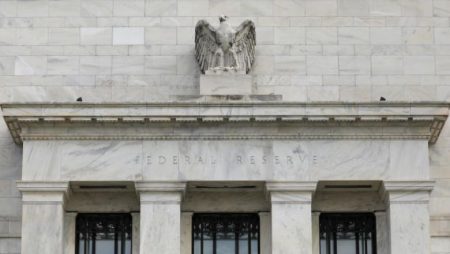Stock markets largely rose on Wednesday, tracking an overnight Wall Street rally after the Federal Reserve chief expressed confidence in the US economy despite global trade war fears.
In foreign exchange, the pound slid to a 2018 low at $1.3010 on slightly receding prospects of a UK interest-rate hike next month after British inflation undershot expectations.
“It seems every time the Bank of England peers through an open window of opportunity to lift UK rates, economic and political headwinds blow it shut again,” traders London Capital Group said in a client note.
The pound has taken a knock this week also from uncertainty surrounding the future of British Prime Minister Theresa May as she struggles to unite a divided Conservative Party over the government’s Brexit strategy.
Across the Atlantic, Fed chief Jerome Powell on Tuesday offered a positive US outlook, citing a strong job market and inflation figures in line with the central bank’s targets, sending stocks higher.
“Powell’s testimony was music to investors’ ears as the Dow gained for the fourth consecutive day while the Nasdaq hit a new high-water mark” on Tuesday, said Stephen Innes, head of Asia-Pacific trading at Oanda trading group.
But Powell acknowledged uncertainty about the “outcome of current discussions over trade policy”, with US President Donald Trump hitting out at China and other economic partners as he adopts an aggressive “America First” policy.
Fears about an all-out China-US trade war continue to rattle investors, with both sides lodging counter-complaints at the World Trade Organization after recently imposing tariffs and threatening more on billions of dollars’ worth of goods.
Washington’s traditional allies Japan and the EU have also not been spared from hefty US tariffs.
In a move described by officials as a “clear message” against protectionism, the EU and Japan signed a sweeping free trade deal on Tuesday, eliminating tariffs for a wide range of products from Japanese cars to French cheese.
Elsewhere on Wednesday, oil prices extended losses after an industry group reported a surprise increase in US inventories. Brent crude struck a fresh three-month low at $71.23 per barrel.
Both main contracts fell following a report on Tuesday by the American Petroleum Institute that US crude stockpiles had increased by more than 600 000 barrels last week.
After withdrawing from the Iran nuclear deal in May, the United States said it would reinstate sanctions on the oil-producing nation, and warned other countries to stop purchasing Iranian exports including crude.
But US Treasury Secretary Steve Mnuchin recently said that Washington would consider making an exception for certain countries that cannot immediately halt imports, adding further pressure on prices.
Traders will on Wednesday study oil inventory data from the US Energy Information Authority for a further indication of crude demand and supply.
” Oil has had some big falls. But every time it drops… there seems to be some sort of supply disruption news that puts the bid back in the market,” said Greg McKenna, chief market strategist at AxiTrader.






No Comment